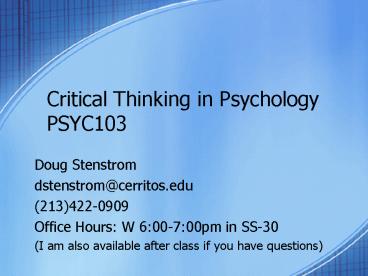Critical Thinking in Psychology PSYC103 - PowerPoint PPT Presentation
1 / 13
Title:
Critical Thinking in Psychology PSYC103
Description:
Title [Product Name] Marketing Plan Author: doug stenstrom Last modified by: doug stenstrom Created Date: 11/8/2006 8:21:50 PM Document presentation format – PowerPoint PPT presentation
Number of Views:151
Avg rating:3.0/5.0
Title: Critical Thinking in Psychology PSYC103
1
Critical Thinking in PsychologyPSYC103
- Doug Stenstrom
- dstenstrom_at_cerritos.edu
- (213)422-0909
- Office Hours W 600-700pm in SS-30
- (I am also available after class if you have
questions)
2
Syllabus
- Course Website
- Objective of the course
- Textbooks
- Weekly Schedule
- Grading Calculations
- Grading Categories
- Late Policy
- Extra Credit
- Question of the Day
3
What is Critical Thinking
- there is no consensus
- A general definition for our class
- The delicate balance between open-mindedness
and skepticism - As nobel-prize winning physicist Richard
Feynman (1985) reminds us Science forces us to
bend over backwards to prove ourselves wrong.
4
What is Critical Thinking
- Another type of definition
- The logical and rationale process of avoiding
ones preconceptions by gathering evidence,
contemplating and evaluating alternatives, and
coming to a conclusion
5
What is Critical Thinking
- Another type of definition
- A set of skills to process and generate
information, and the habit of using those skills
based on intellectual commitment to critical
thinking skills
6
Why is Critical Thinking important?
- Can be learned
- Improves your understanding of psychology
- Understand difference between science and
pseudoscience - Transferable to all topics, not just psychology
- Transferable to all aspects of life
- Protect yourself against false information
- Expose erroneous claims
7
What is covered in this course?
Some examples
Psychological issues Pseudoscience Psychic Phenomena
Distorted Perceptions Homeopathy Psychics and ESP
Framing Effects Ghosts Faith Healing
Memory Biases Mysticism Dowsing
Power of Situation UFOs Tarot Card Reading
Misleading Statistics Alien Abductions Fortune Telling
Self-deception Conspiracy theories Telekinesis
Hypnosis Superstitions Remote Viewing
Popular Press Polygraph Communicating with the dead
8
Always keep in mind
- Our goal is the search, not the answer
- Every topic/issue has more than one side
- The point of the class is NOT to decide which
side is correct or whether the topic is
scientifically valid or not. - There are no right or wrong answers
- When discussing/debating these topics, remember
to focus your comments about the topic, not the
person
9
Survey A and BPlease answer honestly
10
- Survey A
- Reverse items 2, 4, 5, 7, 10, 11, 13, 16, 18, 19
- -3 becomes 3
- -2 becomes 2
- -1 becomes 1
- 0 stays a 0
- 1 becomes -1
- 2 becomes -2
- 3 becomes -3
- Add up all scores
- Higher more dogmatism
- Survey B
- Reverse items 1, 3, 6, 7, 9, 10, 11, 14
- -3 becomes 3
- -2 becomes 2
- -1 becomes 1
- 0 stays a 0
- 1 becomes -1
- 2 becomes -2
- 3 becomes -3
- Add up all scores
- Higher more open-minded
11
DogmatismWhat is it?
- an established belief with relatively
unchangeable certainty - exists among advocates of any belief system
- FYI even science and the scientific method can
be dogmatic to some scientists!
12
DogmatismWhat are the consequences?
- slightly more resistant to opposing fact and
evidence - slightly more often associated with
authoritarian personality - NOT associated with weak reasoning powers
- Instead, associated with less DESIRE to be
open-minded about sources of possible
disconfirming evidence
13
Some helpful suggestions about how to get an A in
this class
- Pay attention to the syllabus
- Attend every class, and be on time
- Read assigned chapters before each class
- Take notes during class
- Ask questions during class
- Use your classmates are resources































